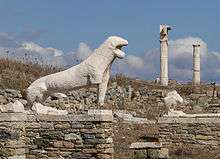Definify.com
Definition 2026
λεών
λέων
See also: Λέων
Ancient Greek

Λίθινος τῆς Δήλου λέων
Noun
λέων • (léōn) m (genitive λέοντος); third declension
- lion
- πολλοὶ μὲν γὰρ λέουσι τῶν ἀνδρῶν εἴξασι καὶ Κενταύροις καὶ τοιούτοισιν ἑτέροις (Plato, Polit. 291.a.9)
- One having the characteristics of a lion (positive or negative): savage, noble, brave.
Inflection
Third declension of λέων, λέοντος
| Case / # | Singular | Dual | Plural |
|---|---|---|---|
| Nominative | ὁ λέων | τὼ λέοντε | οἱ λέοντες |
| Genitive | τοῦ λέοντος | τοῖν λεόντοιν | τῶν λεόντων |
| Dative | τῷ λέοντῐ | τοῖν λεόντοιν | τοῖς λέουσῐ(ν) |
| Accusative | τὸν λέοντᾰ | τὼ λέοντε | τοὺς λέοντᾰς |
| Vocative | λέον | λέοντε | λέοντες |
Usage notes
Alternative forms of the dative plural include λείουσι (late Epic) and λεόντεσσι.
Derived terms
- λεοντοπέτᾰλον (leontopétalon)
Descendants
- Latin: leō
References
- λέων in Liddell & Scott (1940) A Greek–English Lexicon, Oxford: Clarendon Press
- λέων in Liddell & Scott (1889) An Intermediate Greek–English Lexicon, New York: Harper & Brothers
- λέων in Autenrieth, Georg (1891) A Homeric Dictionary for Schools and Colleges, New York: Harper and Brothers
- «λέων» in Bailly, Anatole (1935) Le Grand Bailly: Dictionnaire grec-français, Paris: Hachette
- Bauer, Walter et al. (2001) A Greek-English Lexicon of the New Testament and Other Early Christian Literature, Third edition, Chicago: University of Chicago Press
- «λέων» in Cunliffe, Richard J. (1924) A Lexicon of the Homeric Dialect: Expanded Edition, Norman: University of Oklahoma Press, published 1963
- λέων in Slater, William J. (1969) Lexicon to Pindar, Berlin: Walter de Gruyter
- “G3023”, in Strong’s Exhaustive Concordance to the Bible, 1979
- Woodhouse, S. C. (1910) English-Greek Dictionary: A Vocabulary of the Attic Language, London: Routledge & Kegan Paul Limited.
- Sihler, Andrew L. (1995) New Comparative Grammar of Greek and Latin, Oxford, New York: Oxford University Press
Greek
Alternative forms
- λέοντας (léontas)
- λιοντάρι (liontári)
Noun
λέων • (léon) m (plural λέοντες)
- Katharevousa form of λιοντάρι (liontári, “lion, brave man”)